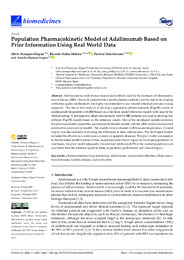Por favor, use este identificador para citar o enlazar este ítem:
https://hdl.handle.net/11000/34576Registro completo de metadatos
| Campo DC | Valor | Lengua/Idioma |
|---|---|---|
| dc.contributor.author | Marquez-Megias, Silvia | - |
| dc.contributor.author | nalda-molina, Ricardo | - |
| dc.contributor.author | Más-Serrano, Patricio | - |
| dc.contributor.author | Ramon-Lopez, Amelia | - |
| dc.contributor.other | Departamentos de la UMH::Ingeniería | es_ES |
| dc.date.accessioned | 2025-01-16T12:50:04Z | - |
| dc.date.available | 2025-01-16T12:50:04Z | - |
| dc.date.created | 2023-10 | - |
| dc.identifier.citation | Biomedicines 2023, 11, 2822 | es_ES |
| dc.identifier.issn | 2227-9059 | - |
| dc.identifier.uri | https://hdl.handle.net/11000/34576 | - |
| dc.description.abstract | : Adalimumab is a fully human monoclonal antibody used for the treatment of inflammatory bowel disease (IBD). Due to its considerably variable pharmacokinetics and the risk of developing antibodies against adalimumab, it is highly recommended to use a model-informed precision dosing approach. The aim of this study is to develop a population pharmacokinetic (PopPK) model of adalimumab for patients with IBD based on a literature model (reference model) to be used in the clinical setting. A retrospective observational study with 54 IBD patients was used to develop two different PopPK models based on the reference model. One of the developed models estimated the pharmacokinetic population parameters (estimated model), and the other model incorporated informative priors (prior model). The models were evaluated with bias and imprecision. Clinical impact was also assessed, evaluating the differences in dose interventions. The developed models Citation: Marquez-Megias, S.; Nalda-Molina, R.; Más-Serrano, P.; Ramon-Lopez, A. Population Pharmacokinetic Model of Adalimumab Based on Prior Information Using Real World Data. Biomedicines 2023, 11, 2822. https://doi.org/10.3390/ biomedicines11102822 Academic Editors: Xiaoyu Yan and Giovanni Pallio Received: 20 July 2023 Revised: 14 September 2023 Accepted: 13 October 2023 Published: 18 October 2023 Copyright: © 2023 by the authors. Licensee MDPI, Basel, Switzerland. This article is an open access article distributed under the terms and conditions of the Creative Commons Attribution (CC BY) license (https:// creativecommons.org/licenses/by/ 4.0/). included the albumin as a continuous covariate on apparent clearance. The prior model was superior to the estimated model in terms of bias, imprecision and clinical impact on the target population. In conclusion, the prior model adequately characterized adalimumab PK in the studied population and was better than the reference model in terms of predictive performance and clinical impact | es_ES |
| dc.format | application/pdf | es_ES |
| dc.format.extent | 12 | es_ES |
| dc.language.iso | eng | es_ES |
| dc.publisher | MDPI | es_ES |
| dc.rights | info:eu-repo/semantics/openAccess | es_ES |
| dc.rights | Attribution-NonCommercial-NoDerivatives 4.0 Internacional | * |
| dc.rights.uri | http://creativecommons.org/licenses/by-nc-nd/4.0/ | * |
| dc.subject | pharmacokinetics | es_ES |
| dc.subject | drug monitoring | es_ES |
| dc.subject | adalimumab | es_ES |
| dc.subject | monoclonal antibodies | es_ES |
| dc.subject | inflammatory bowel diseases | es_ES |
| dc.subject | Crohn’s disease | es_ES |
| dc.subject | ulcerative colitis | es_ES |
| dc.subject.other | CDU::6 - Ciencias aplicadas::62 - Ingeniería. Tecnología | es_ES |
| dc.title | Population Pharmacokinetic Model of Adalimumab Based on Prior Information Using Real World Data | es_ES |
| dc.type | info:eu-repo/semantics/article | es_ES |
| dc.relation.publisherversion | https://doi.org/10.3390/ biomedicines11102822 | es_ES |

Ver/Abrir:
Artículo 3 (1).pdf
1,77 MB
Adobe PDF
Compartir:
 La licencia se describe como: Atribución-NonComercial-NoDerivada 4.0 Internacional.
La licencia se describe como: Atribución-NonComercial-NoDerivada 4.0 Internacional.
.png)